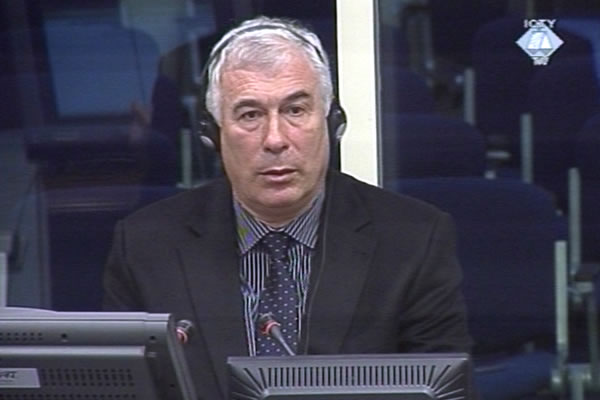Home
MINES THAT KILL ONLY SERBS
Former Croatian minister Jure Radic contends that the Serbs could not return to their homes after Operation Storm because of security risks, including the landmines. This prompted the judges to ask Radic why Croats enjoyed full freedom of movement in the liberated territory
 Jure Radic, witness at the Ante Gotovina, Ivan Cermak and Mladen Markac trial
Jure Radic, witness at the Ante Gotovina, Ivan Cermak and Mladen Markac trial In the cross-examination of Jure Radic, former Croatian minister for development and reconstruction, defense lawyer Kehoe focused more on the ‘context’ in which the high-ranking state officials discussed whether the return of the Serbs to Krajina after Operation Storm was possible at all; he didn’t focus on the contents of the meetings where the issue were raised. The Trial Chamber called Radic to The Hague to clarify what he had said at the meetings of various state bodies: among other things, he said that ‘no more than 10 percent of the Serbs’ should remain in some parts of Krajina, suggesting that Croats should be settled in the abandoned Serb houses.
Gotovina’s defense said that the war raged in BH at the time, close to Krajina. The witness confirmed this, reminding the court that Milosevic was still in power in Serbia. The defense tried to prove that the public addresses of Croatian officials showed the real attitude of the Croatian state leadership towards the return of Serbs, more so than their words in various meetings behind closed doors. In a public address Tudjman urged ‘all Serbs who didn’t participate in armed rebellion’ to remain in Croatia. Tudjman made this call in the media on the first day of Operation Storm, on 4 August 1995. Radic said that the call to the Serbs to stay was sincere, but ‘Serbs left on their own will’, ‘contrary to the president’s wishes’.
Defense counsel Kehoe showed minutes from the government meeting held two weeks after Operation Storm was launched. Radic tells Tudjman about the situation in the liberated territory saying, ‘our men have done a lot of torching, to this day, I don’t know how it can be prevented’. Because President Tudjman replied that such incidents should be prevented, the defense contends it shows that there was no intention to prevent the Serbs from returning to Krajina. The witness agreed.
As he continued his description of ‘the context’ for the return of the Serb refugees, the witness said that the security situation was difficult. Those who returned were exposed to different security risks, including mines. That is why, Radic clarified, the situation in Krajina had to be normalized first before a mass return of the Serb refugees could be organized. Since Croatian citizens had full freedom of movement in the liberated territory, Judge Klinis asked the witness how it was possible that the Croat returnees didn’t face the same security risks. Radic replied that the authorities ‘publicly told’ everyone that the time was not yet ripe for them to return, but couldn’t identify a single instance when this was said in public, apart from his purported speeches to Croats in refugee camps.
Former minister and Tudjman’s close associate Jure Radic completed his evidence. The second witness of the Trial Chamber will appear in the courtroom on Thursday, 4 March 2010.
Linked Reports
- Case : Gotovina et al. - "Operation Storm"
- 2010-02-25 ‘TO CROATIZE’ IS TO ‘EUROPEANIZE’
- 2010-02-24 SERBS, CROATS AND BOSNIAKS ALL BECAME CROATS
- 2010-02-18 KNIN EC MONITORS’ LOGBOOK NOT IN EU ARCHIVES
- 2010-03-04 ‘MYSTERY’ OF KISTANJE
- 2010-03-05 NOT KNOWING ENGLISH AS ALIBI
- 2010-03-15 CROATIA GETS FREE REIN, PERMANENTLY
